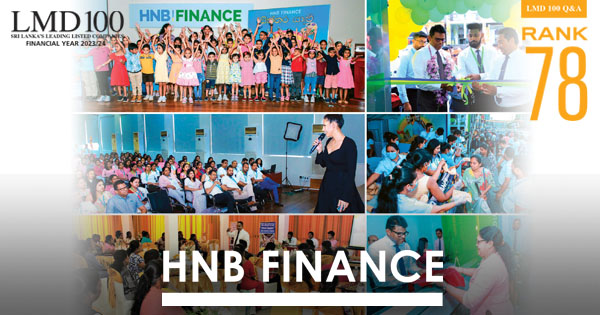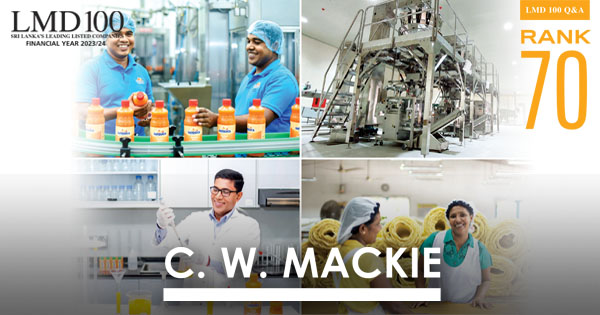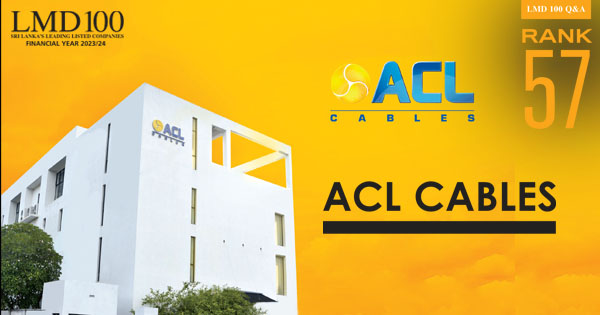JOHN KEELLS HOLDINGS
LMD 100 Q&A
RANK 5
The private sector’s ability to drive growth hinges on continued investment in technology, talent and sustainable practices, along with an enabling and consistent policy environment

Deputy Chairperson
Group Finance Director
Q: How does the City of Dreams Sri Lanka contribute to the growth of your group, and what role do you envision it playing in transforming the economy and tourism industry?
A: Marking a significant culmination of events for the group’s iconic integrated resort, which has been under construction over the last decade, Cinnamon Life at City of Dreams Sri Lanka was launched in mid-October 2024.
The completion of the integrated resort is set for mid-2025 with the opening of the Nuwa hotel, casino and retail mall. While operations have commenced and continued for a short period of time, the feedback received to date has well exceeded expectations.
Being the largest and most ambitious private sector investment in the country at an investment of over US$ 1.2 billion, we are confident that the project will be transformational for our group and the country – as seen with other integrated resorts in the region – and is envisioned to play a pivotal role in leisure and entertainment in South Asia.
The opening of integrated resorts and gaming facilities has aided other countries to accelerate their tourism momentum – supported by higher rates and occupancy, and foreign exchange inflows – in addition to indirectly benefiting the country’s development through employment creation, among others.
Currently employing over 1,400 people, City of Dreams Sri Lanka is envisaged to create more than 20,000 direct and indirect job opportunities. I’m grateful to the numerous teams that have worked on this project, braving many obstacles and challenges to deliver an icon that we at John Keells Holdings (JKH) are proud of.
Q: As Sri Lanka embarks on a fresh chapter in the context of politics and the economy, how ready and geared is the corporate sector to drive growth while overcoming the ripples of past challenges?
A: The corporate sector is well positioned to play a pivotal role in driving economic recovery and supporting growth, in the wake of a more stable macroeconomic and also political environment after the recent elections.
Following multiple periods of economic turbulence, the significant transformation of the economy – due to prudent and difficult measures and reforms – has laid a strong and stable foundation for a sustainable path to fiscal consolidation and growth, which creates a favourable platform for business.
The low inflation regime, stable interest rates hovering below 10 percent, and a strengthened Sri Lankan Rupee have boosted consumer and business confidence.
And the headway on the debt restructuring process, which is near finalisation, coupled with the Central Bank of Sri Lanka and World Bank’s revised economic growth forecasts – now set at between four and 4.4 percent, up from between two and three percent – further reinforce a positive outlook.
The private sector’s ability to drive growth hinges on continued investment in technology, talent and sustainable practices, along with an enabling and consistent policy environment.
While corporates have navigated multiple challenges, the environment and outlook now pave the way for a less cautious approach, and requires renewed focus on attracting foreign direct investments (FDIs), and further developing technical know-how and knowledge transfer through partnerships and collaborations, to drive productivity and growth.

Q: How is your group faring against the backdrop of the prevailing macroeconomic milieu?
A: After consecutive challenges since 2019, it is encouraging to operate in a less volatile environment with a positive macroeconomic outlook, which has restored confidence in the country’s prospects.
The current recovery trend in tourism is expected to continue with growth across all major source markets and an increase in flight capacity.
Tourism will be a key catalyst to drive the continued recovery of the economy, particularly through the positive impact on foreign exchange earnings and improving disposable incomes, considering the cascading and multiplier effects of tourism.
Sustained economic growth in the region, largely driven by India, is expected to benefit the Port of Colombo through higher trade volumes. Higher volumes of vessel movement and increased bunker demand driven by the Red Sea crisis is expected to continue until a resolution is reached.
Sri Lanka’s consumer discretionary spend is envisaged to continue its encouraging recovery momentum, benefiting our consumer foods and retail businesses. Buyer interest and momentum in our residential apartment sales is envisaged to continue, given the improving macroeconomic environment including the low interest rate regime.
Despite the macroeconomic challenges, the group has showcased resilience, achieving growth while strategically pursuing opportunities for the future.
A notable example is the introduction of the new energy vehicle (NEV) business by John Keells CG (JKCG) Auto, in collaboration with BYD, reflecting our forward-looking approach and focus on sustainable innovation.

Q: Considering the South Asian region, what business and investment prospects do you see for your group?
A: Proximity to India, one of the world’s fastest growing economies, opens up substantial opportunities for Sri Lanka. In the context of the JKH portfolio, several of our businesses are strategically positioned to capitalise on these prospects.
India’s economic growth and the resulting rise in outbound travel have been evident in recent years. This trend could substantially boost tourist arrivals to Sri Lanka and our leisure businesses including City of Dreams Sri Lanka are well positioned to capture this growing demand.
Leveraging on Sri Lanka’s strategic location, the country has the potential to transform into an even more significant regional transportation and logistics hub.
Our port operations at South Asia Gateway Terminals (SAGT) and West Container Terminal (WCT-1) are strategically placed to cater to the increasing trade volumes across the region.
Additionally, our beverages business has entered the Indian market through a partnership with Reliance Consumer Products, enabling the manufacturing, marketing, distribution and sale of beverages under the Elephant House brand in India.

Q: How is your group embracing environmental, social and corporate governance (ESG) standards?
A: The group remains committed to continuously integrating ESG principles into our operations and long-term objectives.
To further enhance the group’s ESG strategy, we recently reformulated our ESG framework through a rigorous process, identifying material ESG aspects and defining both group-wide and industry group specific ambitions, to ensure strong alignment between overarching group goals and the specific objectives of each industry group.
Long-term group ambitions include reaching ‘plastic positive’ goals, achieving net zero and enhancing the sustainability of our supply chains.
In conjunction with operationalising a roadmap to achieving our ESG ambitions, we continue to work towards minimising our ecological footprint and implementing a circular economy.
The wellbeing of our stakeholders remains a priority, through endeavours such as the ‘ONE JKH’ initiative and community engagement programmes.
Over the years, projects such as the Cinnamon Rainforest Restoration Project, higher education and English language scholarships, the Good Water Initiative and Plasticcycle have been a testament to our longstanding commitment to sustainability and fostering positive social impact.
The group’s robust corporate governance framework – founded on transparency, accountability, participation and integrity – underpins our decision making. We follow a proactive approach in upholding transparency through our dynamic governance framework, which evolves to meet global standards, regulatory changes and stakeholder expectations.
The Transparency in Corporate Reporting (TRAC) report 2023 by Transparency International Sri Lanka (TISL) ranked JKH first for the fourth consecutive year with a 100 percent score for disclosure practices while LMD ranked JKH as its ‘Most Respected’ entity for the 19th year.
REVENUE (RS. M)
280,773
REVENUE CHANGE
1%
PROFIT AFTER TAX (RS. M)
12,128
PROFIT CHANGE
(36)%
TOTAL ASSETS (RS. M)
771,192
SHAREHOLDERS’ FUNDS (RS. M)
357,867
MARKET CAP (RS. M)
290,771
EARNINGS PER SHARE (RS.)
8.06
PRICE EARNINGS RATIO
24.10
EMPLOYEES
15,314
Telephone: 2306000 | Email: jkh@keells.com | Website: www.keells.com





